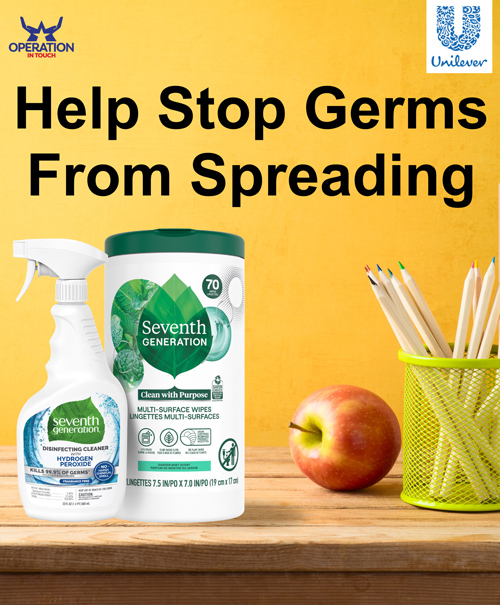
Help Stop Germs From Spreading with Seventh Generation
Tips to Help Stop Germs From Spreading
When someone in your house starts to sniffle, there are measures you can take to help keep everyone else healthy. These tips will help you stop germs from spreading:
- Get vaccinated. The single best way to keep from getting the flu and spreading it to your family is to get vaccinated each year. The more people that get vaccinated against the flu, the less the flu can spread through the community.
- Wash with soap and water. [2] We can’t say it enough: Handwashing is one of the best ways to help stop viruses and bacteria from spreading. But getting little ones to wash is easier said than done, right? Teach toddlers proper handwashing before they get sick: Lather up for at least 20 seconds, or the time it takes to sing “Happy Birthday”.
Choose the right disinfectant cleaner for your household.
EPA registered disinfectants that are registered for a broad variety of germs, including common bacteria and viruses. The EPA registered disinfectants for use against the current coronavirus. Please note, Seventh Generation disinfectants (Link opens in new window.) are EPA registered disinfectants, however are not listed under the EPA’s Emerging Viral Pathogen program at this time. We have submitted an application under this program and will provide an update here once EPA review is completed.
Seventh Generation disinfecting cleaners with CleanWell™ patented technology kill 99.99% of household germs botanically on hard nonporous surfaces. These disinfecting cleaners can be used around kids and are effective against Influenza A viruses including H1N1 and Rhinovirus, the Common Cold virus.
Disinfect strategically. When someone in your house is sick, a disinfectant product can help kill household germs. The CDC recommends disinfecting areas where there can be large numbers of household germs — and where there is a possibility that these germs could be spread to others. Here are some hotspots to hit:
- Doorknobs
- Faucet handles
- Toilet flushers
- Bathrooms
- Smartphones
- Keyboards
- Light switches
- Remote controls
- Countertops
- Tables
- Avoid close contact. If you’re caring for a sick child, encourage the other kids to play in their own rooms for a few days. If it’s you who’s under the weather, try to avoid contact with healthy people as much as possible. (Yes, that means letting the dishes pile up, microwaving dinner, and allowing the kids to entertain themselves.)
- Don’t share. Reaching for your partner’s towel to wipe your hands or letting kids share blankets on the couch is everyday routine. But when someone’s sick, it’s best to make sure everyone uses their own eating utensils, towels, pillows, and blankets. Do wash the sick person’s stuff before anyone else uses it, but don’t worry about washing separately from your normal dishes and laundry.
- Throw away your tissues. Covering your sneeze or cough with your sleeve or a tissue can help keep germs contained. But germs can lurk on used tissues for hours (yuck!). Throw tissues straight in the trash can instead of letting them pile up on the couch, where they can spread even more germs.
- Regular clothes washing can help remove bacteria, dirt, and soil. Washing your clothes after you are out on the town or in a public place can help maintain good personal hygiene and help ensure clothes don’t harbor or create a nice environment for germs. [3]
- Good hygiene habits can help reduce the spread of disease. The Center for Disease Control (CDC) recommends that you wash your hands for 20 seconds after you cough, sneeze, blow your nose, or have been in a public place. [1] Washing your hands often with soap is one of the best defensive measures you can take to keep you and your family healthy.
References:
[1] https://www.cdc.gov/coronavirus/2019-ncov/index.html (Link opens in new window.)
[2] https://www.cdc.gov/handwashing/when-how-handwashing.html (Link opens in new window.)
[3] https://www.cdc.gov/coronavirus/2019-ncov/prepare/cleaning-disinfection.html (Link opens in new window.)
Read the original article by clicking here. (Link opens in new window.)


